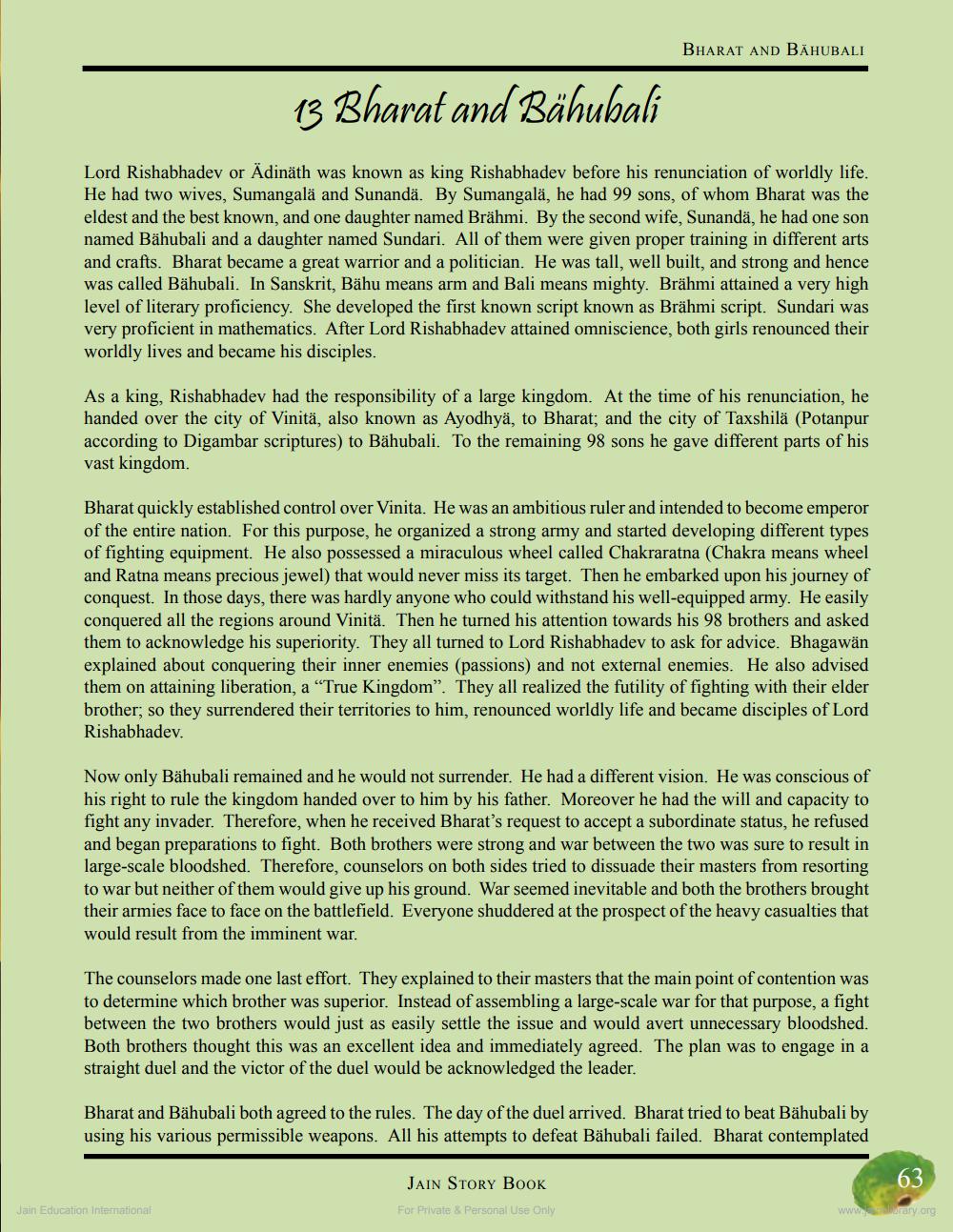________________
BHARAT AND BÄHUBALI
13 Bharat and Bähubali
Lord Rishabhadev or Adinath was known as king Rishabhadev before his renunciation of worldly life. He had two wives, Sumangala and Sunanda. By Sumangalä, he had 99 sons, of whom Bharat was the eldest and the best known, and one daughter named Brähmi. By the second wife, Sunandä, he had one son named Bahubali and a daughter named Sundari. All of them were given proper training in different arts and crafts. Bharat became a great warrior and a politician. He was tall, well built, and strong and hence was called Bahubali. In Sanskrit, Bähu means arm and Bali means mighty. Brähmi attained a very high level of literary proficiency. She developed the first known script known as Brähmi script. Sundari was very proficient in mathematics. After Lord Rishabhadev attained omniscience, both girls renounced their worldly lives and became his disciples.
Is called Bähubali.came a great warrior and a polit of them were given pro
As a king, Rishabhadev had the responsibility of a large kingdom. At the time of his renunciation, he handed over the city of Vinitä, also known as Ayodhyä, to Bharat; and the city of Taxshilä (Potanpur according to Digambar scriptures) to Bähubali. To the remaining 98 sons he gave different parts of his vast kingdom.
Bharat quickly established control over Vinita. He was an ambitious ruler and intended to become emperor of the entire nation. For this purpose, he organized a strong army and started developing different types of fighting equipment. He also possessed a miraculous wheel called Chakraratna (Chakra means wheel and Ratna means precious jewel) that would never miss its target. Then he embarked upon his journey of conquest. In those days, there was hardly anyone who could withstand his well-equipped army. He easily conquered all the regions around Vinitä. Then he turned his attention towards his 98 brothers and asked them to acknowledge his superiority. They all turned to Lord Rishabhadev to ask for advice. Bhagawan explained about conquering their inner enemies (passions) and not external enemies. He also advised them on attaining liberation, a "True Kingdom". They all realized the futility of fighting with their elder brother, so they surrendered their territories to him, renounced worldly life and became disciples of Lord Rishabhadev.
Now only Bähubali remained and he would not surrender. He had a different vision. He was conscious of his right to rule the kingdom handed over to him by his father. Moreover he had the will and capacity to fight any invader. Therefore, when he received Bharat's request to accept a subordinate status, he refused and began preparations to fight. Both brothers were strong and war between the two was sure to result in large-scale bloodshed. Therefore, counselors on both sides tried to dissuade their masters from resorting to war but neither of them would give up his ground. War seemed inevitable and both the brothers brought their armies face to face on the battlefield. Everyone shuddered at the prospect of the heavy casualties that would result from the imminent war.
The counselors made one last effort. They explained to their masters that the main point of contention was to determine which brother was superior. Instead of assembling a large-scale war for that purpose, a fight between the two brothers would just as easily settle the issue and would avert unnecessary bloodshed. Both brothers thought this was an excellent idea and immediately agreed. The plan was to engage in a straight duel and the victor of the duel would be acknowledged the leader.
Bharat and Bahubali both agreed to the rules. The day of the duel arrived. Bharat tried to beat Bähubali by using his various permissible weapons. All his attempts to defeat Bahubali failed. Bharat contemplated
JAIN STORY BOOK
63
Jain Education International
For Private & Personal use only
www
tary.org




